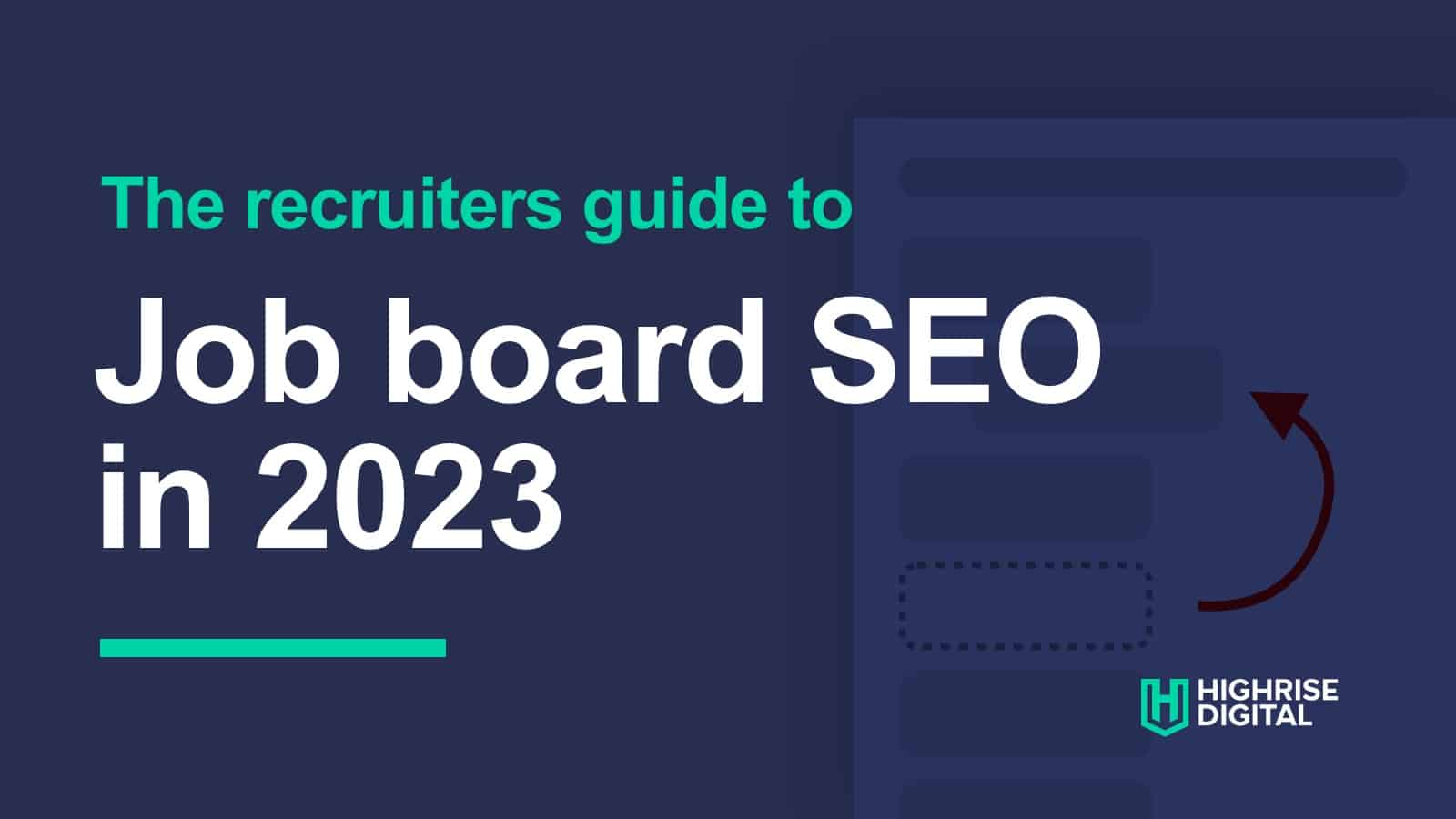
What is Job board SEO?
Job board SEO is the process of optimising a job board website to improve its visibility and ranking in search results for relevant keywords.
With the increasing use of search engines by job seekers to find job openings, it is important for recruiters to ensure that their job boards are optimised for search engines in order to attract more qualified candidates.
75% of job seekers use search engines to find job opportunities
https://www.jobvite.com/wp-content/uploads/2017/01/Jobvite_Recruiter_Nation_2017.pdf
Why optimise your job board?
Optimising a job board website for search engines can bring a number of benefits, including attracting more qualified candidates, improving the visibility of job listings, and increasing website traffic.
By implementing effective job board SEO techniques, job boards can improve their chances of ranking well in search results and reaching a wider audience of job seekers.
Overall, job board SEO is an important aspect of a successful recruitment strategy and can help recruitment agencies attract more qualified candidates to their website.
In this article, we will explore some of the benefits and key techniques of job board SEO.
The benefits of job board SEO
Job board SEO, the process of optimising a job board website for search engines, can bring a number of benefits to a job board.
By implementing effective SEO techniques, job boards can improve their chances of ranking well in search results and reaching a wider audience of job seekers.
There are several benefits to using SEO to optimise a job board website:
Attract more qualified candidates
By ranking well in search results for relevant keywords, a job board website can attract more qualified candidates to its job listings.
Improve the visibility of job listings
By optimising job listings for relevant keywords and including detailed information about the job, a job board can improve the chances of those listings ranking well in search results and being seen by more qualified candidates.
Increase website traffic
By ranking well in search results, a job board website can increase its overall website traffic and reach a wider audience of job seekers.
Enhance the user experience
By optimising the website for search engines, a job board can improve the overall user experience by making it easier for job seekers to find job listings and relevant information on the website.
Overall, job board SEO can help job boards attract more qualified candidates, improve the visibility of their job listings, increase website traffic, and enhance the user experience.
While you’re here
We can help you set your recruitment website free using the power of open-source.
Get in touch today about your recruitment website design.
Job board SEO vs ‘normal’ SEO
Most of job board SEO follows the same fundamentals as regular SEO. However there are a few differences:
- Keywords: The keywords used in normal SEO may be different from those used in SEO for job boards. In normal SEO, the focus may be on broad, general keywords related to a business or industry. In contrast, SEO for job boards may focus on more specific and targeted keywords, such as job titles, locations, and industry-specific terms.
- Content: The content of a normal website may focus on a wide range of topics related to a business or industry. In contrast, the content of a job board website will likely be more focused on job listings and related information, such as company profiles, career advice, and salary data.
- User intent: The user intent behind a search query may be different between normal SEO and SEO for job boards. For example, someone searching for “marketing jobs” may have a different intention than someone searching for “marketing strategies.”
- Competition: The competition for ranking well in search results may be different between normal SEO and SEO for job boards. In normal SEO, businesses may be competing with a wide range of websites for the same keywords. In contrast, job boards may be competing with a more specific group of websites, such as other job boards and company career websites.
The key differences between normal SEO and SEO for job boards include the focus on targeted keywords, specific content, user intent, and competition for ranking well in search results.
Key techniques for job board SEO
Here are a few key techniques to help you improve your job board SEO:
Use relevant and targeted keywords
Use keywords that are relevant to the job openings and services offered on the job board, and include them in the page titles, headings, and content. This will help search engines understand what the job board is about and improve its chances of ranking well for those keywords.
Consider a recruitment agency who are focused on accountancy jobs in London, and compare these two approaches:
| Un-optimised home page | Optimised home page | |
|---|---|---|
| Title | ABC Recruitment | Accountancy jobs in London | ABC Recruitment |
| h1 | Welcome to our website! | Find the best accountancy jobs in London with ABC Recruitment |
| Content | We are a family run business who have served London for 23 years. | With over 1,000 active London-based roles, find your next accountancy job today. |
Which of these two websites do you think that search engines would rank higher for the search “Accountancy jobs in London”?
For example, if you are a recruitment agency in the UK who specialise in aviation jobs, it might be really difficult to rank well for “aviation jobs uk”.
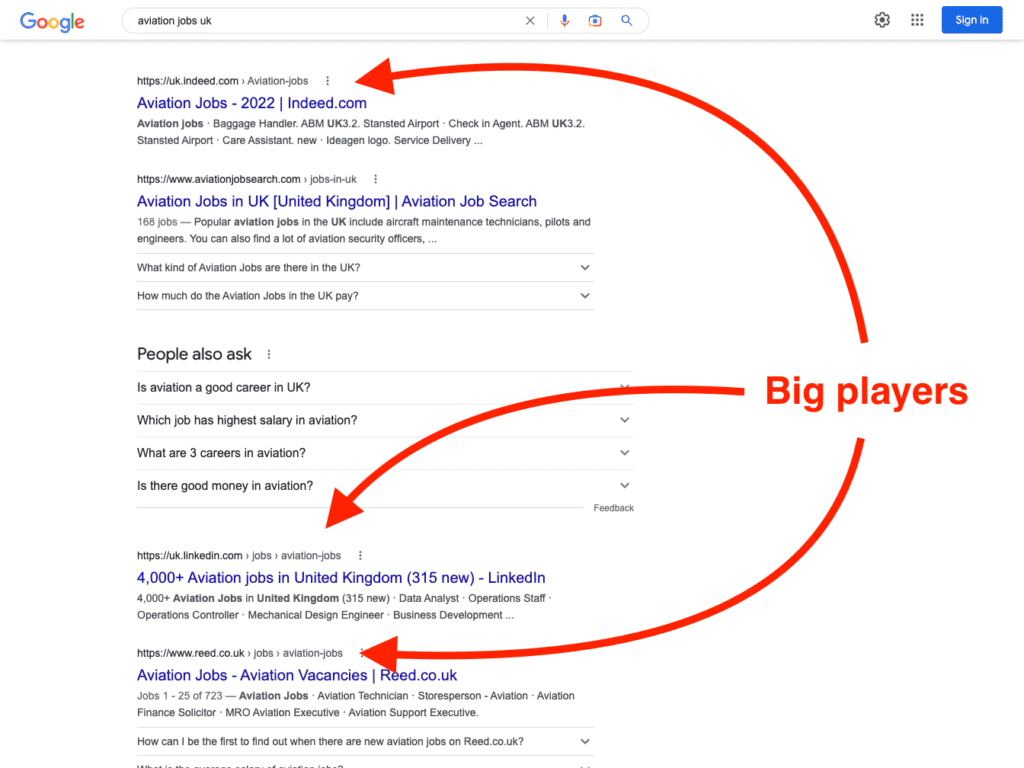
aviationjobsearch.com can compete with the bigger players due to optimised usage of their keyword – “aviation jobs”.
Using long tail keywords
Another SEO strategy that you can use to compete with bigger more established competitors is to use “long tail” keywords.
Long tail keywords are more specific and longer phrases that are less competitive and have lower search volumes, but can still drive qualified traffic to a website.
Taking the “aviation jobs” example above, it’s probably much easier to rank for “aviation jobs in Scotland” or “aviation management jobs” than the more generic search.
One way to target longer-tail keywords is local search.
Optimising your job board for local search
Optimising a job board for local search involves making sure that the job board is easily discoverable by users searching for jobs in a specific location.
46% of all Google searches are local
source: https://moz.com/local-search-ranking-factors
There are several ways to optimise a job board for local search:
- Include the name of the city or region in the job titles and descriptions. This will help the job postings to show up in search results for specific locations.
- Use local keywords and phrases throughout the job board. For example, if the job board is for jobs in New York City, you should use terms like “NYC” and “New York” throughout the site.
- Optimise the job board’s listing on local business directories, such as Google My Business, Yelp, and Bing Places for Business.
- Use the “hreflang” attribute to indicate to search engines which version of the job board is intended for users in specific countries or regions.
- Encourage local businesses to post their job openings on the job board. This will help to increase the relevance and authority of the job board for local searches.
By following these best practices, you can improve the visibility and ranking of the job board in local search results and attract more qualified candidates to your open positions.
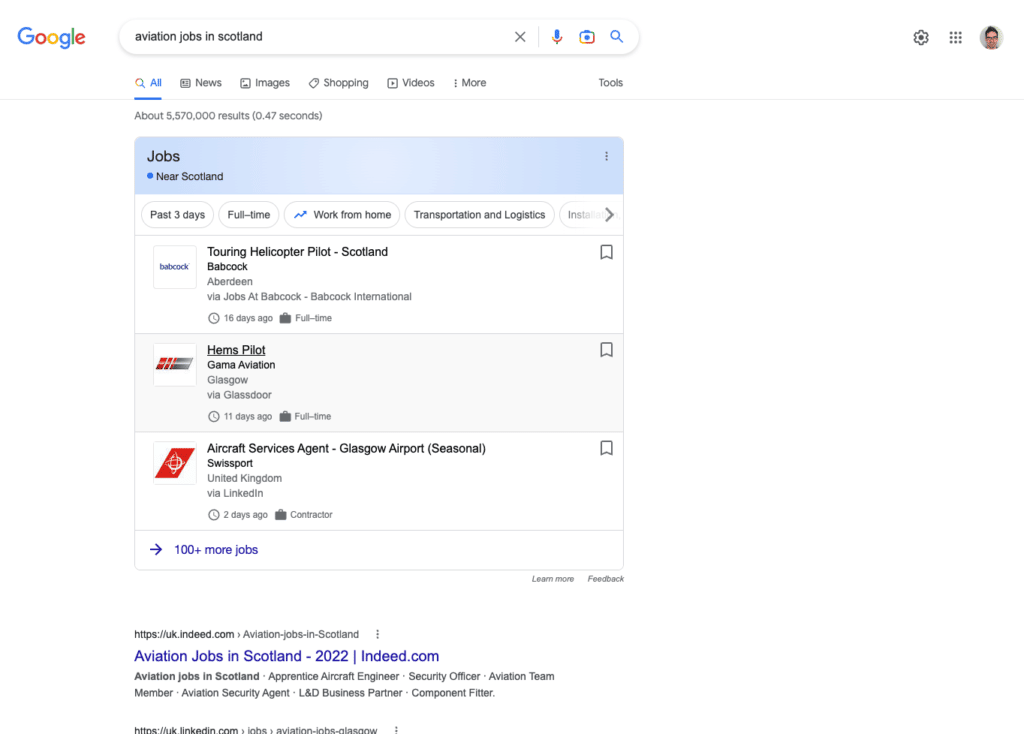
Landing pages
Ranking for job-specific search terms is highly competitive, and it’s likely that you’ll be competing with large, established job boards- e.g. Monster, Indeed, CV Library, etc.
One way to gain an advantage over these bigger players is to create landing pages around specific, niche keywords that are relevant to your jobs.
What is a landing page?
A landing page is a webpage that is designed to direct users to a specific action or conversion. It is called a landing page because it is the page where users “land” after clicking a link, usually from a search engine or an external website. Landing pages are often used in online advertising and marketing campaigns to promote a specific product, service, or event.
A landing page typically has a clear and specific call to action, such as filling out a form or making a purchase. The purpose of a landing page is to convert visitors into leads or customers by persuading them to take a specific action.
Landing pages are an important part of any online marketing strategy because they provide a focused and targeted experience for users. By creating a separate landing page for each marketing campaign or product, it is easier to track the effectiveness of the campaign and make improvements as needed.
Take the example of “legal jobs”.
A Google search for this gives me the following results:
- Legal Jobs in London – 2022 | Indeed
- TotallyLegal: Search Legal Jobs & Vacancies | Law Careers – totallylegal.com
- Law Gazette Jobs | Jobs | Choose from 5,965 live vacancies – The Law Society Gazette
- Law & Legal Jobs – Guardian Jobs
- Browse jobs | The Lawyer Jobs – The Lawyer
- Legal Jobs – Legal Vacancies | Reed.co.uk – Reed
- 12,000+ Legal jobs in London, England, United … – LinkedIn
- Law and legal | Explore careers – gov.uk
However, if I search for “in-house legal jobs”:
- View the latest In-House Counsel Jobs – TotallyLegal
- The latest In-House Solicitors Jobs – The Lawyer
- In House Legal Jobs in London – Reed
- Legal In House Jobs – Law Gazette Jobs – The Law Society Gazette (landing page)
- In House Lawyer Jobs – 2022 – Indeed
- 8000+ In House Counsel jobs in United Kingdom (3343 new) – LinkedIn
- In-House Legal jobs – Hays (landing page)
- In House Legal Jobs – BCL Legal
For the more specific search, most of the big, generic job boards lose some of their ranking and are replaced by more niche offerings.
For example, Hays and The Law Society Gazette are able to break into the top 8 here partly due to the extra information they include on their ‘landing page’.
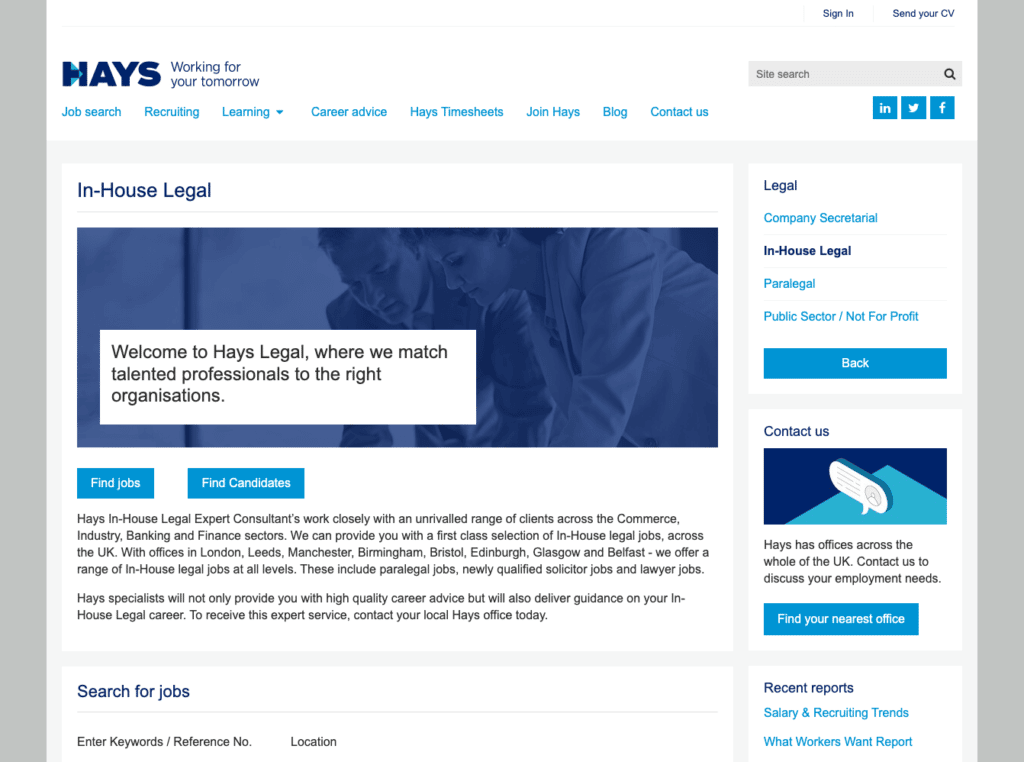
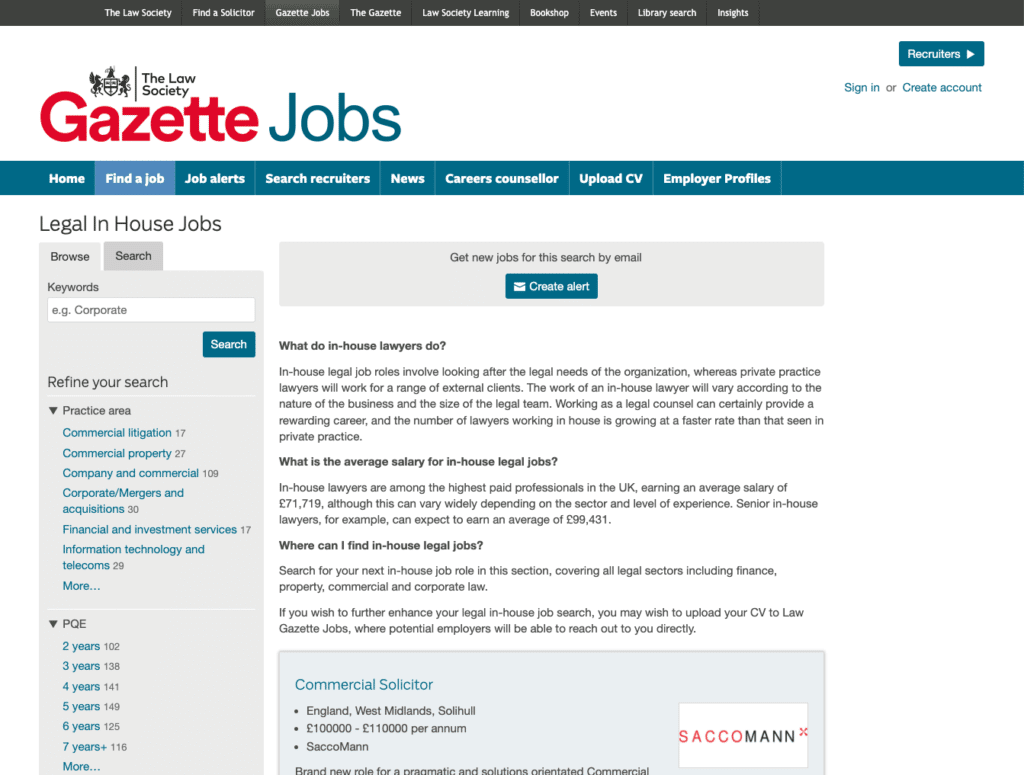
Supporting content
Most recruitment agency websites are more than just a job board. They are often a source of information, advice and news.
Creating quality, supporting content can help improve the rankings of your job board.
In our “aviation jobs” example, if I search for “aviation jobs in Scotland”, one of the results looks like this:

Here we can see that Google has ranked the specific “jobs-in-scotland” page of the aviationjobsearch.com website.
But not only that, Google has found and identified two other pages on that site that are relevant. These are blog posts related to the search and are clearly influencing Google’s display, and potentially the ranking itself.
Structured data and Google for Jobs
Structured data is a standardised format for providing information about a page and classifying the page content. It allows search engines to better understand the content on a website and provide more relevant results to users.
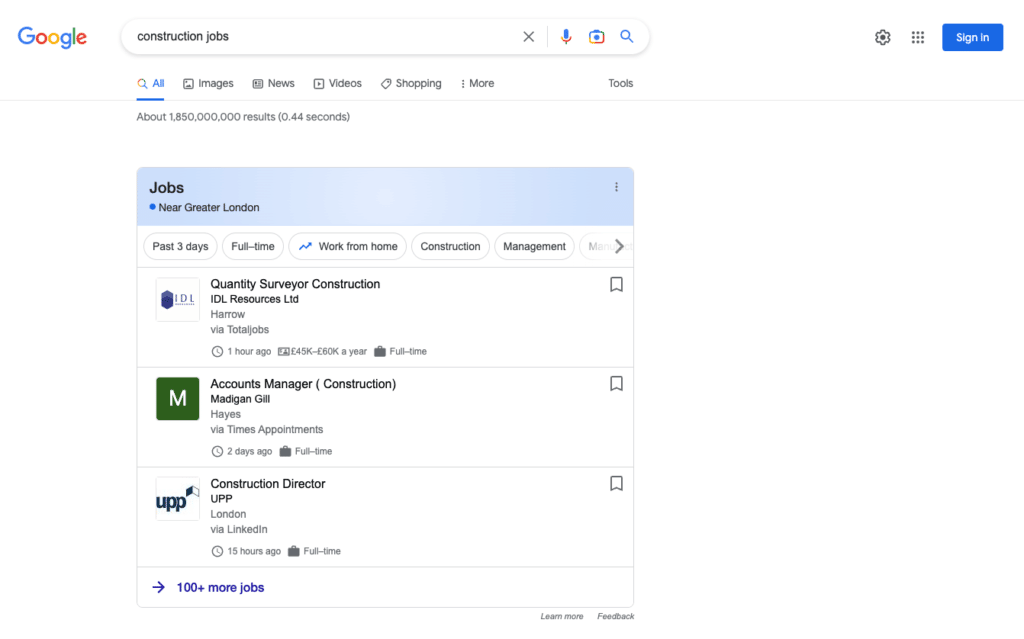
Google for Jobs is a feature that allows job seekers to search for jobs from various sources, including job boards, directly from Google.
In order to be included in Google for Jobs, job boards need to implement structured data on their websites. This helps Google understand the content on the job board and provide more relevant job listings to users.
Structured data can also help improve the SEO of a job board by making it easier for search engines to understand the content on the website. This can lead to higher search rankings, which can drive more traffic to the job board.
Additionally, by using structured data to mark up job listings, a job board can show rich results in the search results, which can make it more attractive to job seekers and improve the user experience.
Improve overall domain authority
Although not specific to job boards, it would be foolish to ignore domain authority in your SEO efforts.
Any efforts to improve your website domain authority will have a beneficial effect on your job board.
You can almost guarantee that if the BBC launched a job board on bbc.co.uk that it would rank very highly.
What is domain authority?
Domain authority is a measure of the strength of a website’s content and backlinks, with higher scores indicating a greater likelihood of the website ranking well in search engine results pages, and it is important because it can affect the visibility and ranking of a website in search engine results.
Should you use a sub-domain for your job board?
Using a subdomain can have some disadvantages for SEO.
One disadvantage is that subdomains are treated as separate websites by search engines, so any links or authority that the subdomain has will not directly benefit the main domain.
This means that if you want to rank well for certain keywords, you will need to build up the authority of the subdomain separately from the main domain, which can take more time and effort.
It is generally better for SEO to keep all content on a single, top-level domain, rather than using a subdomain.
What is a sub-domain?
A subdomain is a specific part of a larger domain that can be used to organise and structure a website, or to host content that is distinct from the main website.
For example, a company might have their main website at “www.example.com” and create a subdomain for their job board at “jobs.example.com”.
Optimise job listings
It’s unlikely, although not impossible for your individual job listings to rank on search engines.
One reason for this is that they often don’t last long enough for Google to index them.
However, it’s still worth a bit of effort as you might end up ranking for very specific keyword searches.
To optimise you job posts include detailed information about each job in the listings, including the location, requirements, duties, and any other relevant details.
Use internal linking
Use internal linking to link to other pages on the job board, which can help search engines discover more of the website’s pages and improve its chances of ranking well.
Add internal links to the pages that you want to rank (e.g. your landing pages) in prominent places on your website, including your main navigation and footer.
If you are blogging (you should be!) make sure to include links from and to your blog posts.
What is internal linking?
Internal linking refers to the process of linking to other pages on the same website.
Internal linking is important for several reasons:
- It helps to organise and structure a website, making it easier for users to find and navigate to different pages.
- It helps to distribute link equity, or the value that is passed through links, throughout a website. This can help to improve the ranking of the linked-to pages in search engine results.
- It can help to increase the amount of time that users spend on a website, as they are more likely to click on and explore internal links.
- It can also help to improve the crawlability of a website, as search engines can use internal links to discover and index new pages.

Optimise for mobile
This one sounds old-fashioned, but it’s still true and it’s surprising how many recruitment sites are terrible on mobile – and it’s 2023!
Make sure that your job board is optimised for mobile devices, as more and more job searches are being conducted on smartphones.
Think of people searching on the bus or train during their commute.
Conclusion
Job board SEO is important because it can help the job board attract more traffic and potentially more job seekers and employers.
When job seekers search for jobs online, they often use search engines to find job board websites.
If a job board ranks highly in search results, it is more likely to be visited by job seekers, which can lead to more job postings and revenue for the job board.
Job board SEO can also help employers find the job board more easily, which can lead to more job postings and revenue for the job board.
In summary, job board SEO can help a job board attract more traffic and potentially more job seekers and employers, which can lead to increased revenue for the job board.
Get in touch
We’d love to discuss your next recruitment website project with you.